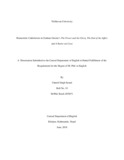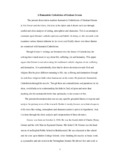Please use this identifier to cite or link to this item:
https://elibrary.tucl.edu.np/handle/123456789/2977| Title: | Humanistic Catholicism in Graham Greene’s The Power and the Glory, The End of the Affair and A Burnt-out Case |
| Authors: | Saud, Umesh Singh |
| Keywords: | Philosophy;Novels;English Literature |
| Issue Date: | 2018 |
| Publisher: | Central Department of English |
| Abstract: | This dissertation analyses three of Graham Greene’s novels, namely The Power and the Glory, The End of the Affair and A Burnt-out Case to show how Greene, through his novels, promotes humanistic Catholicism and provides a sharp critique of Christian dogmas and beliefs. He tries to replace abstract God by putting humans at the centre. His attitude towards strict religious doctrines of the Roman Catholic Church is critical. For him serving humans is the true essence of religion. However, Greene equally puts emphasis on restoring faith in God and spirituality. Through his novels he promotes the view that no humans can fully understand and live life without faith in God. Moreover, his novels redefine the concept of suffering, sin, love, redemption, sacrifice and hatred. Through characters like whiskey Priest, Sarah and Querry, Greene shows that every human either it be a morally corrupt priest, unfaithful wife or an atheist, he/she can achieve spiritual redemption through love, compassion and sacrifice. The final finding of this dissertation is that Greene’s continuous conflict between secular self and religious self put him in ambivalent position. |
| URI: | http://elibrary.tucl.edu.np/handle/123456789/2977 |
| Appears in Collections: | English |
Files in This Item:
| File | Description | Size | Format | |
|---|---|---|---|---|
| Cover Page(5).pdf | 22.71 kB | Adobe PDF |  View/Open | |
| Chapter Page(1).pdf | 220.45 kB | Adobe PDF |  View/Open |
Items in DSpace are protected by copyright, with all rights reserved, unless otherwise indicated.
